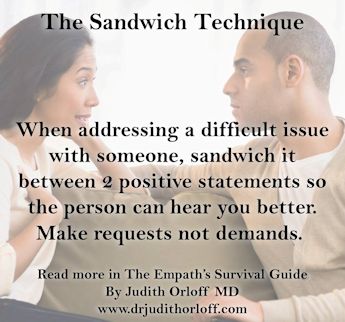For more relationship tips to use with The Sandwich Technique get my PDF “Life Strategies for Sensitive People” here.
The Sandwich Technique is a mindful, sensitive communication strategy which everyone (including sensitive people) can use to transform the relationships with their partner, friends, family, and co-workers.
This technique is not intended to be fake or simply to placate others. Being brutally direct can backfire and make people feel defensive and unable to hear your comments (no matter how useful they are).
When you use The Sandwich Technique, make requests not demands. Then, when you are communicating about a difficult issue, you sandwich the request between two positive statements. It’s a creative way of presenting challenging topics so that others can hear you. Let’s say you need more alone time. First you could say, “I appreciate all your support and I need your help with this.” Then place your request: “It would be great I can take more alone time to decompress. This will help me be even more present with you later.”
You empower your relationships by expressing your needs. Also, relationships thrive on both people feeling accepted. One patient told me, “My husband accepts me as I am. Through his acceptance I have learned to be true to myself.”
We all have issues to resolve in relationships no matter how good the match. To do this, we need to have loving, creative conversations.
4 Tips to Apply with The Sandwich Technique from “The Empath’s Survival Guide.”
1. Focus on a single emotional issue and don’t repeat yourself. We can have many emotional issues going on simultaneously which can be overwhelming for us and others. The best way to communicate is by sharing one issue at a time without repeating it, unless being asked for clarification. My partner says he feels like his brain is being squeezed if I raise too many problems at once, or if I keep repeating myself to make a point. Men, especially, tend to be task oriented, and they like to be helpful. Multiple requests for change make it all seem impossible.
2. Don’t take things personally, even when they are personal. This is an important but demanding principle of the spiritual path yet it’s basic to good communication and relationship harmony. Try to be less reactive to comments and more centered so you aren’t triggered as often or as intensely.
3. Observe the “No Yelling Rule.” Many of us, especially sensitive people, become overwhelmed around yelling and loud voices. Our partners need to understand how unproductive and hurtful this can be. For the sake of self-preservation, I’m strict about this rule in my house.
4. Don’t be a people pleaser or try to fix your partner. We become tired when we try to fix others’ problems or keep trying to please them at the expense of our own needs. So, practice loving detachment and set boundaries. For instance, my partner dislikes getting instructions on self-improvement. When he’s going through a hard time, he has trained me to say, “I have faith that you can handle it,” rather than offering suggestions he didn’t ask for. It’s a gift to let others be themselves and face their own difficulties.
_____
Good relationships are possible for everyone, including sensitive people. They can enhance your sense of security, love, and grounding. Marriage or any kind of sacred union needs to be a competition of generosity. Each person is in service to the other, aiming to deepen their devotion, kindness, passion, and love every day. In relationships, you can learn from each other. Consideration and tolerance is essential.
(Adapted from The Empath’s Survival Guide: Life Strategies for Sensitive People by Judith Orloff MD.)




Dear Dr. Orloff, You are an amazing woman who is a fantastic help and resource for us who are ‘sensitive’, empathic, and struggling with many things; communication and self-acceptance being 2 important issues.
I have 2 of your fantastic books, and they’ve made a huge difference in my life. Thank you from the bottom of my sensitive heart!! Thank you for sharing your own personal journey with such candor. I’ve come to feel better about my own perceptions, intuitions, and beyond ‘normal’ experiences. I’ve tried to be ‘normal’ all of my life, and now I know that I’m blessed and ok with my differences. Your a life changer, and a life saver! Please know that your work is so important for those who don’t fit into this extroverts world. I am grateful and a true fan!
Sending best wishes and many blessings to you. Sara
Thank you for this technique and it is straightforward to use with family, which is great.
I appreciate the comment,”I have faith you can handle it.” I get tired trying to come up with solutions to other people’s problems. TY. Enjoy your work.